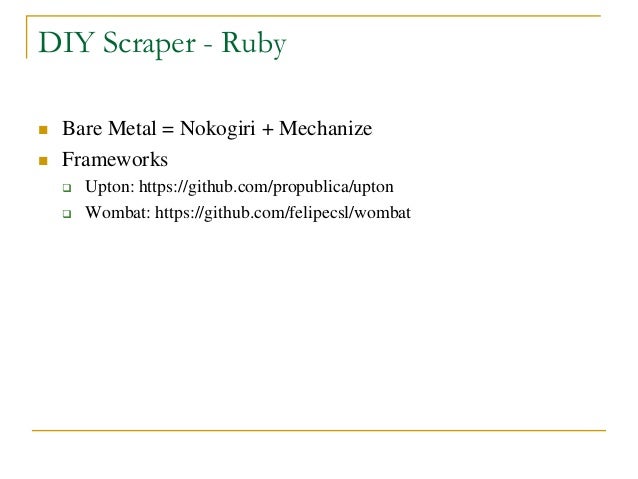What is Web scraping (Web Scraping with Python) Web Scraping (also known as Data Extraction, Web Harvesting, and Screen Scraping) is a way of extracting large amounts of data from single or multiple websites and save it into a local file on your pc in Database or (CSV, XML, JSON) formats. Mar 10, 2021 Scrapy is a powerful Python web scraping and web crawling framework. Scrapy provides many features to download web pages asynchronously, process them and save them. It handles multithreading, crawling (the process of going from link to link to find every URL in a website), sitemap crawling, and more.


Web Scraping com Python e BeautifulSoup. GitHub Gist: instantly share code, notes, and snippets. Web scraping with Python Web scraping is an automated, programmatic process through which data can be constantly 'scraped' off webpages. Also known as screen scraping or web harvesting, web scraping can provide instant data from any publicly accessible webpage. On some websites, web scraping may be illegal. Web Scraping with Python This is the repository for the LinkedIn Learning course Web Scraping with Python. The full course is available from LinkedIn Learning. Instructor Ryan Mitchell teaches the practice of web scraping using the Python programming language.
| importurllib2 |
| frombs4importBeautifulSoup |
| # http://segfault.in/2010/07/parsing-html-table-in-python-with-beautifulsoup/ |
| f=open('cricket-data.txt','w') |
| linksFile=open('linksSource.txt') |
| lines=list(linksFile.readlines()) |
| foriinlines[12:108]: #12:108 |
| url='http://www.gunnercricket.com/'+str(i) |
| try: |
| page=urllib2.urlopen(url) |
| except: |
| continue |
| soup=BeautifulSoup(page) |
| title=soup.title |
| date=title.string[:4]+','#take first 4 characters from title |
| try: |
| table=soup.find('table') |
| rows=table.findAll('tr') |
| fortrinrows: |
| cols=tr.findAll('td') |
| text_data= [] |
| fortdincols: |
| text='.join(td) |
| utftext=str(text.encode('utf-8')) |
| text_data.append(utftext) # EDIT |
| text=date+','.join(text_data) |
| f.write(text+'n') |
| except: |
| pass |
| f.close() |

commented Jan 15, 2018 •
import pandas as pd from bs4 import BeautifulSoup import requests import lxml url = 'http://espn.go.com/college-football/bcs/_/year/2013 ' result = requests.get(url) c= result.content soup.prettify() summary = soup.find('table',attrs = {'class':'tablehead'}) #tables = summary.fins_all('td' /'tr') data =[] rows = tables[0].findAll('tr') list_of_rows=[] for row in table.findAll('tr')[0:]: outfile = open('./Rankings.csv', 'wb') Can please you help me with this code? Am using python 3.5 |
Web Scraper Github
Table of Contents
In this tutorial, we first provide an overview of some foundational concepts about the World-Wide-Web. We then lay out some common approaches to web scraping and compare their usage. With this background, we introduce several applications that use the Selenium Python package to scrape websites.

This tutorial is organized into the following parts:
- Basic concepts of the World-Wide-Web.
- Comparison of some common approaches to web scraping.
- Use-cases for when to use the Selenium WebDriver.
- Illustration of how to find web elements using Selenium WebDriver.
- Illustration of how to fill in web forms using Selenium WebDriver.

We plan to add more applications in the near future. The content of this tutorial is a work in progress, and we are happy to receive feedback! If you find anything confusing or think the guide misses important content, please email: help@iq.harvard.edu.
Custom Websites
We decided to build custom websites for many of the examples used in this tutorial instead of scraping live websites, so that we have full control over the web environment. This provides us stability —– live websites are updated more often than books, and by the time you try a scraping example, it may no longer work. Also, a custom website allows us to craft examples that illustrate specific skills and avoid distractions. Finally, the maintainers of a live website may not appreciate us using them to learn about web scraping and could try to block our scrapers. Using our own custom websites avoids these risks, however, the skills learnt in these examples can certainly still be applied to live websites.
Below I list the name and its link for each of the custom websites we have built for this tutorial:
- static student profile webpage
- dynamic search form webpage
- dynamic table webpage
- dynamic search load webpage
- dynamic complete search form webpage
Authors and Sources
Python Scraper Github
Jinjie Liu at IQSS designed the structure of the guide and created the content. Steve Worthington at IQSS helped design the structure of the guide and edited the content. We referenced the following sources when we wrote this guide:
- Web Scraping with Python: Scrape data from any website with the power of Python, by Richard Lawson (ISBN: 978-1782164364)
- Web Scraping with Python: Collecting Data From the Modern Web, by Ryan Mitchell (ISBN: 978-1491910276)
- Hands-on Web Scraping with Python: Perform advanced scraping operations using various Python libraries and tools such as Selenium, Regex, and others, by Anish Chapagain (ISBN: 978-1789533392)
- Learning Selenium Testing Tools with Python: A practical guide on automated web testing with Selenium using Python, by Unmesh Gundecha (ISBN: 978-1783983506)
